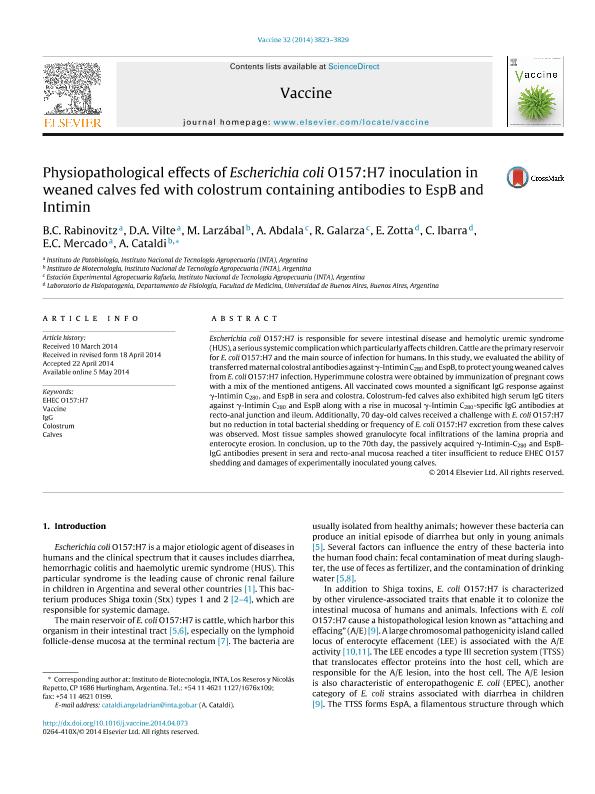Artículo
Physiopathological effects of Escherichia coli O157:H7 inoculation in weaned calves fed with colostrum containing antibodies to EspB and Intimin
Ravinovitz, Bettina; Vilte, Daniel Alejandro; Larzabal, Mariano ; Abdala, Alejandro Ariel; Galarza, Roxana; Zotta, Elsa; Ibarra, Cristina Adriana
; Abdala, Alejandro Ariel; Galarza, Roxana; Zotta, Elsa; Ibarra, Cristina Adriana ; Mercado, Elsa Cristina; Cataldi, Ángel Adrián
; Mercado, Elsa Cristina; Cataldi, Ángel Adrián
 ; Abdala, Alejandro Ariel; Galarza, Roxana; Zotta, Elsa; Ibarra, Cristina Adriana
; Abdala, Alejandro Ariel; Galarza, Roxana; Zotta, Elsa; Ibarra, Cristina Adriana ; Mercado, Elsa Cristina; Cataldi, Ángel Adrián
; Mercado, Elsa Cristina; Cataldi, Ángel Adrián
Fecha de publicación:
01/2014
Editorial:
Elsevier
Revista:
Vaccine
ISSN:
0264-410X
Idioma:
Inglés
Tipo de recurso:
Artículo publicado
Clasificación temática:
Resumen
Escherichia coli O157:H7 is responsible for severe intestinal disease and hemolytic uremic syndrome (HUS), a serious systemic complication which particularly affects children. Cattle are the primary reservoir for E. coli O157:H7 and the main source of infection for humans. In this study, we evaluated the ability of transferred maternal colostral antibodies against gamma-Intimin C280 and EspB, to protect young weaned calves from E. coli O157:H7 infection. Hyperimmune colostra were obtained by immunization of pregnant cows with a mix of the mentioned antigens. All vaccinated cows mounted a significant IgG response against gamma-Intimin C280, and EspB in sera and colostra. Colostrum-fed calves also exhibited high serum IgG titers against gamma-Intimin C280 and EspB along with a rise in mucosal gamma-Intimin C280-specific IgG antibodies at recto-anal junction and ileum. Additionally, 70 day-old calves received a challenge with E. coli O157:H7 but no reduction in total bacterial shedding or frequency of E. coli O157:H7 excretion from these calves was observed. Most tissue samples showed granulocyte focal infiltrations of the lamina propria and enterocyte erosion. In conclusion, up to the 70th day, the passively acquired gamma-Intimin-C280 and EspB-IgG antibodies present in sera and recto-anal mucosa reached a titer insufficient to reduce EHEC O157 shedding and damages of experimentally inoculated young calves.
Palabras clave:
CALVES
,
COLOSTRUM
,
EHEC O157:H7
,
IGG
,
VACCINE
Archivos asociados
Licencia
Identificadores
Colecciones
Articulos(OCA HOUSSAY)
Articulos de OFICINA DE COORDINACION ADMINISTRATIVA HOUSSAY
Articulos de OFICINA DE COORDINACION ADMINISTRATIVA HOUSSAY
Articulos(SEDE CENTRAL)
Articulos de SEDE CENTRAL
Articulos de SEDE CENTRAL
Citación
Ravinovitz, Bettina; Vilte, Daniel Alejandro; Larzabal, Mariano; Abdala, Alejandro Ariel; Galarza, Roxana; et al.; Physiopathological effects of Escherichia coli O157:H7 inoculation in weaned calves fed with colostrum containing antibodies to EspB and Intimin; Elsevier; Vaccine; 32; 1-2014; 3823-3829
Compartir
Altmétricas



